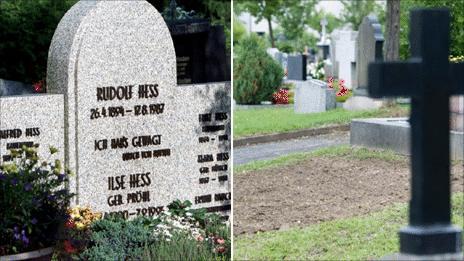Top Nazi Rudolf Hess exhumed from 'pilgrimage' grave
- Published

Before and after: Rudolf Hess's grave was demolished to prevent neo-Nazis holding rallies there on the anniversary of his death
The grave holding the remains of Adolf Hitler's deputy Rudolf Hess has been destroyed to stop it being used as a pilgrimage site by neo-Nazis.
Hess's bones were exhumed at the graveyard in the town of Wunsiedel, southern Germany, early on Wednesday.
The remains were later cremated and are to be scattered at sea.
Hess was captured after flying to Britain in 1941 and sentenced to life in prison. He killed himself in a Berlin jail in 1987 at the age of 93.
As he requested in his will, he was buried in the small Bavarian town of Wunsiedel, where his family had a holiday home and where his parents were already interred.
The local Lutheran church which supervises the cemetery gave its permission for the burial at the time, ruling that the wishes of the deceased could not be ignored.
But they and local people have since become concerned by the number of far-right groups visiting the grave.
'Peace'
Each year on the anniversary of his death, neo-Nazis have attempted to stage a march to the cemetery, saluting the grave with its epitaph "I dared", and laying floral wreaths.
A member of the church council, Hans-Juergen Buchta, told the Associated Press news agency: "The whole town was shut down and in turmoil and there was a huge police presence. We here at the graveyard were not always able to cope."
A 2005 court order banning such gatherings had little effect so the church decided to terminate the family's lease on the grave as of October 2011.
A granddaughter of Hess objected to the decision and filed a lawsuit in an attempt to prevent it going ahead, but was eventually persuaded by the parish council to drop the case and allow the exhumation to go ahead.
Roland Schoeffel, the deputy mayor of Wunsiedel, told AFP news agency that the monument had been razed "in an operation not open to the public".
Cemetery administrator Andreas Fabel told AP news agency on Thursday: "The grave is now empty. The bones are gone."
One resident, named as Mrs Koenig, said: "Perhaps we will now have some peace when he is gone. Perhaps they won't come any more, which is what Wunsiedel wants."
Charlotte Knobloch, the head of the Jewish community in Munich and Upper Bavaria, welcomed the move.
"For decades this town and its inhabitants were terrorised by far-right extremists from all over the world," she is quoted as saying by AFP.
Hess was one of Hitler's closest aides. But in 1941 he made a solo flight to Scotland, where his plane crash-landed, in an apparently unauthorised peace mission which was denounced by the fuhrer.
He was imprisoned by the British for the duration of the war.
At the Nuremberg Trials in 1946, Hess was cleared of war crimes and crimes against humanity but convicted of crimes against peace and jailed for life.
He spent 40 years in Spandau Prison in Berlin.
He was the last remaining inmate at the prison when he was found hanged there in August 1987.
- Published10 May 2011
- Published4 May 2011
- Published23 October 2010